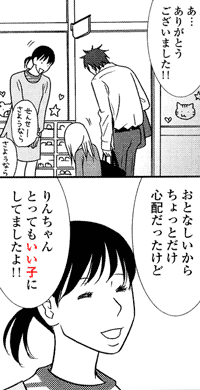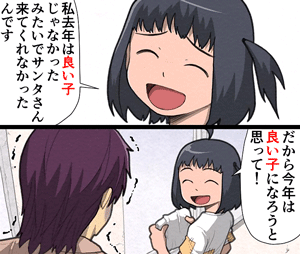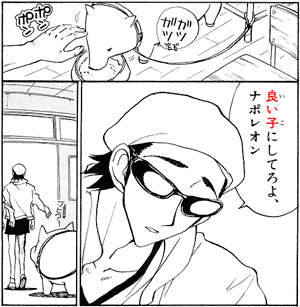In Japanese, ii ko いい子, also spelled ii ko 良い子, means "good child," or "good kid." It can also be used toward adults, animals, etc. depending on context to say they're a "good," ii いい, person, animal, etc. See ko 子 for details.
The phrase yoi ko よい子 is a synonymous variant.
Usage
The basic usage of ii ko いい子 is, obviously, toward children. It implies they're well-behaved, don't do much mischief, respect their parents, do their homework, brush their teeth before bed, etc. etc..
- ii ko da
いい子だ
[He's] a good child.
[He's] a good kid.
[He's] a good [boy].
[She's] a good [girl].
The opposite would be a warui ko 悪い子, "bad child," since warui 悪い is the antonym of ii いい.
The phrase ii ko is sometimes repeated when used to comfort children:
- yoshi yoshi, ii ko ii ko
よしよしいい子いい子
There, there, good [boy], good [boy].
There, there, good [girl], good [girl].
いい子にしてた
The phrase ii ko ni shiteta いい子にしてた means "has been a good kid." Grammatically, it's ii ko followed by a contraction of ni suru にする conjugated to the past form of the te-iru form. Basically:
- ii ko ni suru
いい子にする
To make it so it's an ii ko.
To make [someone] a good kid. - ii ko ni shite-iru
いい子にしている
To be making [someone] a good kid.
To be making [oneself] a good kid.
To be being a good kid.- ii ko ni shiteru
いい子にしてる
- ii ko ni shiteru
- ii ko ni shite-ita
いい子にしていた
To have made [someone] a good kid.
To have made [oneself] a good kid.
To have been a good kid.- ii ko ni shiteta
いい子にしてた
- ii ko ni shiteta
- Context: guy comes take his child from a "nursery school," hoikuen 保育園.
- a... arigatou gozaimashita!!
あ・・・ありがとうございました!!
T... thank you [for everything]!!- Past tense of arigatou gozaimasu.
- sensee sayounara
せんせーさようなら
Good bye, teacher. - sayounara
さようなら
Good bye. - otonashii kara chotto dake shinpai datta kedo
おとなしいからちょっとだけ心配だったけど
[She's] quiet so [I] was a bit worried, but - Rin-chan tottemo ii ko ni shitemashita yo
りんちゃんとってもいい子にしてましたよ!!
Rin-chan was a very good [girl], [you see]!!
- Context: it's Christmas and a grade school student is cleaning the school windows. But why?
- watashi kyonen wa ii ko
janakatta
mitai de Santa-san
kite-kurenakatta-n-desu
私去年は良い子じゃなかったみたいでサンタさん来てくれなかったんです
It seems last year I wasn't a good child so Santa-san didn't come [for me]. - dakara kotoshi wa
ii ko ni narou to
omotte!
だから今年は良い子になろうと思って!
As such, [I] thought: this year [I] will become a good kid!
いい子にしててね
The phrase ii ko ni suru can also be conjugated to an imperative te-form like this:
- ii ko ni shite-ite ne
いい子にしていてね
Be a good kid, [ok]? - ii ko ni shitete ne
いい子にしててね
- Contraction of the te-form of the te-iru-form of suru. I.e.
- suru. (dictionary form.)
- shi. (nominal.)
- shi-te. (te-form.)
- shi-te-i-ru. (te-iru-form.)
- shi-te-i-te. (te-form of te-iru-form.)
- shi-te-te. (contraction.)
Similar phrases include:
- ii ko ni shinasai
いい子にしなさい
Be a good kid. - ii ko ni shitetara
いい子にしてたら
If [you're] a good kid...
- Context: Harima Kenji feeds Napoleon.
- gatsu gatsu
ガツガツ
*eating noise* (onomatopoeia.) - ponpon
ポンポン
*tap tap* (mimetic word.) - ii ko ni shitero yo,
Naporeon
良い子にしてろよ、ナポレオン
Be a good [pig], Napoleon.- shitero してろ
shiteiro していろ
Imperative form of te-iru form.
- shitero してろ
- Harima Kenji leaves Napoleon behind.
- buhi?
ブヒ?
*concerned pig noise*
Malicious Usage
The phrase ii ko いい子 isn't always used to sincerely say "good kid." Sometimes, it's used maliciously, by evil, nasty characters.
When this happens, ii ko いい子 has the nuance of "obedient," "submissive." That is, the evil character is saying: "be a good kid and do as I say."
This, obviously, comes from the fact that "good kids" behave well and obey their parents.
In general, there are two ways ii ko is used in an impurely:
- A figure of authority, usually an old, corrupt villain, tells an young, just subordinate to not meddle in his corrupt affairs.
- A character is blackmailing another, and uses ii ko to humiliate them by comparing them to a child.
Fortunately, you can easily tell, in manga, whether the speaker is impure or not:
- sou
そう
[That's right.] - ii ko da ne
いい子だね
[You're] a good [girl], [aren't you]? - Roze
ロゼ
Rosé. (her name.)




No comments: